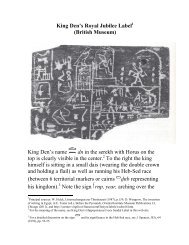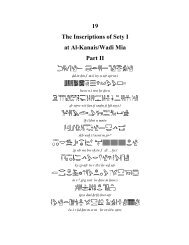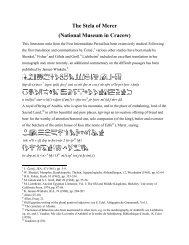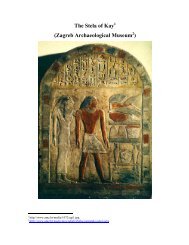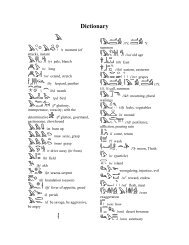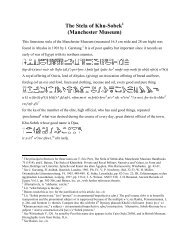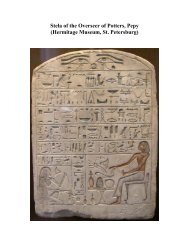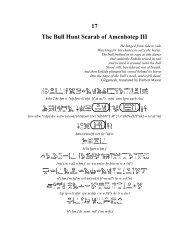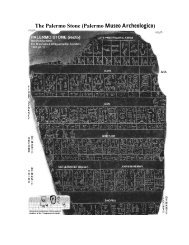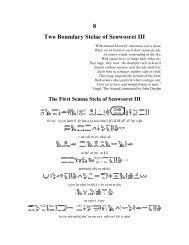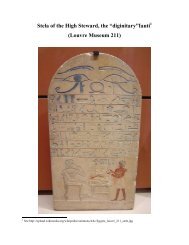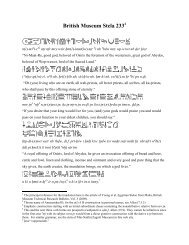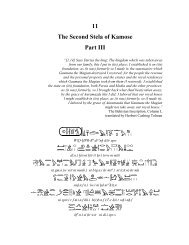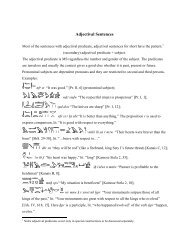7 The Stela of Irtisen - Middle Egyptian Grammar through Literature
7 The Stela of Irtisen - Middle Egyptian Grammar through Literature
7 The Stela of Irtisen - Middle Egyptian Grammar through Literature
Create successful ePaper yourself
Turn your PDF publications into a flip-book with our unique Google optimized e-Paper software.
As noted above, the expression bw-nb (the second part <strong>of</strong> an indirect genitive)<br />
emphasizes the uniqueness <strong>of</strong> the knowledge by comparing it to all the people. Exception<br />
is made to Irtysen himself (wp(w) Hr.i “except me,” lit. “separated from”) and to the<br />
eldest son with an easy stative construction involving the 3ae-inf. adjective-verb wai<br />
“alone.” Fatherly affection is emphasized using an indirect genitive using smsw “eldest<br />
(one)” combined with xt.i “my body.” Divine (royal) command (the stela has HD not<br />
wD) for the son to follow his father’s footsteps uses circumstantial sDm.n.f /perfect, and<br />
the following noun clause (expressing subsequent action) is governed by the prospective<br />
/subjunctive <strong>of</strong> iri: “<strong>The</strong> god has commanded that he act as.” This time the verb form <strong>of</strong><br />
pri is less ambiguous, most probably a perfective passive participle pr “one who is<br />
brought forward.” <strong>The</strong> dative refers to the king, and once again Xr.s indicates possession:<br />
“having the knowledge.” Alternatively, if there is a missing suffix pronoun .i after pr:<br />
pr(.i) n.f Xr.s then the sentence becomes active, with the meaning that the King has<br />
ordained the father to handle down his pr<strong>of</strong>essional knowledge to his son, an equally<br />
reasonable circumstance.<br />
iw mAn(.i) prt awi.f m irt (i)m(i)-r kAt m aAt nb(t) Spst<br />
HAt-r HD Hna nbw pHwi-r Ab(w) r hbn(i)<br />
<strong>The</strong> particle iw introduces the main clause in which the governing verb mAA is most likely<br />
in the circumstantial/imperfective sDm.f with the special form mAn. It fits well in the<br />
context as this verb form expresses an action that is generally true (in this case Irtysen’s<br />
son’s efficiency). <strong>The</strong> circumstantial Dm.n.f /perfect mA.n(.i) is also possible. As such it<br />
would point to a completed action, that is, Irtysen’s conviction that his son is worthy to<br />
be considered as his successor. In either case the suffixed subject is omitted. <strong>The</strong> object is<br />
the noun phrase prt awi that uses the (feminie plural) active participle <strong>of</strong> pri, lit. “what<br />
comes out <strong>of</strong> his hands.” It carries the meaning <strong>of</strong> efficiency, ability, as well as results <strong>of</strong><br />
work. <strong>The</strong> m + infinitive construction applied to the verb iri expresses concomitant action<br />
(to mAn(.i)). imi-r kAt “overseer <strong>of</strong> work” is a well-know phrase as well as aAt nbt Spst “all<br />
kinds <strong>of</strong> precious stones/minerals.” HAt-r … pHwi-r is the <strong>Middle</strong> <strong>Egyptian</strong> way <strong>of</strong> writing



